
Pakistan Journal of Analytical & Environmental Chemistry
Scope & Guideline
Exploring Innovative Solutions in Chemical Analysis
Introduction
Aims and Scopes
- Analytical Chemistry Techniques:
The journal publishes research utilizing a range of analytical techniques, such as spectrophotometry, chromatography, and electrochemical methods, to analyze chemical compounds in various matrices. - Environmental Chemistry and Pollution Studies:
A significant focus is on environmental chemistry, including studies on pollution sources, heavy metal contamination, and the environmental impact of industrial activities. - Green Chemistry and Sustainable Practices:
The journal encourages research on green chemistry principles, promoting sustainable practices in chemical synthesis and waste management. - Nanotechnology Applications:
Research on nanomaterials and their applications in environmental remediation, sensors, and pharmaceuticals is a core area of interest, reflecting the growing importance of nanotechnology in analytical chemistry. - Biochemistry and Pharmacology:
Studies on the biochemical properties of natural compounds, drug interactions, and the development of analytical methods for pharmaceuticals are also prominent.
Trending and Emerging
- Microfluidics and Automation in Analytical Chemistry:
There is a growing trend towards the development and application of microfluidic systems, which offer automation and miniaturization for enhanced analytical capabilities. - Bioremediation and Waste Management Techniques:
Research focused on biological methods for the remediation of contaminated environments, as well as innovative waste management solutions, is gaining prominence, reflecting a shift towards sustainable practices. - Health and Environmental Risk Assessments:
Studies assessing the health risks associated with chemical contaminants in food, water, and the environment are increasingly featured, highlighting the importance of public health in environmental chemistry. - Nanomaterials in Environmental Applications:
The application of nanomaterials for environmental remediation and as sensors for detecting pollutants is a rapidly emerging theme, showcasing the innovative intersection of nanotechnology and environmental science. - Green Synthesis of Chemicals and Materials:
There is an increasing focus on green synthesis methods for producing chemicals and materials, emphasizing the journal's commitment to sustainability and eco-friendly practices.
Declining or Waning
- Traditional Chemical Analysis Methods:
There appears to be a reduced emphasis on conventional chemical analysis methods in favor of more innovative and advanced techniques, reflecting a shift towards modern analytical approaches. - General Environmental Monitoring:
Broad studies on environmental monitoring without specific focus or innovative methodologies are becoming less common, as the journal seems to favor more targeted and impactful research. - Basic Agricultural Chemistry:
Research focused solely on basic agricultural chemistry, such as soil nutrient analysis, has diminished as the journal pivots towards more interdisciplinary studies involving environmental impacts and sustainability.
Similar Journals

Talanta Open
Championing Quality and Accessibility in ScienceTalanta Open (ISSN: 2666-8319) is a prominent open-access journal published by Elsevier, dedicated to advancing the field of Analytical Chemistry. Established in 2020, the journal aims to foster innovative research and facilitate knowledge sharing in the analysis of chemical substances and their interactions. With an impressive Q2 ranking in the Analytical Chemistry category and a commendable Scopus ranking of #57/156, Talanta Open has quickly established itself as a vital resource for researchers, professionals, and students alike. The journal is known for its rigorous peer-review process and commitment to quality, ensuring that published content significantly contributes to the scientific community. By providing unrestricted access to high-quality research, Talanta Open underscores the importance of collaboration and accessibility in the ever-evolving landscape of analytical science.

Journal of the Iranian Chemical Society
Fostering Collaboration for a Brighter Chemical FutureThe Journal of the Iranian Chemical Society, published by SPRINGER, is a prominent academic journal dedicated to advancing the field of chemistry. With an ISSN of 1735-207X and an E-ISSN of 1735-2428, this quarterly journal has been contributing valuable research from 2006 to 2024. Situated in Germany, it serves as a vital platform for chemists and researchers to disseminate their findings, particularly within the miscellaneous chemistry category, where it ranks in the Q3 quartile for 2023. Despite its current lack of open access options, the journal maintains a solid presence in the academic community, evidenced by its Scopus ranking of #165 out of 408 in general chemistry and a commendable 59th percentile. The journal's objective aims to foster innovation and collaboration in chemical research, making it an essential resource for professionals and students keen on pioneering developments in the field. As a subscriber, you will gain insights into cutting-edge research that drives the future of chemistry.
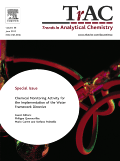
TRAC-TRENDS IN ANALYTICAL CHEMISTRY
Pioneering Insights in Environmental and Spectroscopic AnalysisTRAC - Trends in Analytical Chemistry is a prestigious journal published by Elsevier Science Ltd, situated in the Netherlands. With an impressive impact factor reflected in its Q1 rankings across three major categories—Analytical Chemistry, Environmental Chemistry, and Spectroscopy—this journal stands at the forefront of disseminating pioneering research and advancements in the field of analytical chemistry. Established in 1981, TRAC provides a comprehensive platform for researchers to share influential studies and insights related to the latest trends, methodologies, and technologies in analytical techniques. Recognized globally, the journal excels in fostering cross-disciplinary dialogue and innovation, making it an indispensable resource for academics, professionals, and students alike. Explore the latest issues to stay abreast of cutting-edge developments that shape the analytical sciences.

Chemistry Africa-A Journal of the Tunisian Chemical Society
Fostering Innovation in African ChemistryChemistry Africa - A Journal of the Tunisian Chemical Society, published by SpringerNature, stands as a key platform for the dissemination of research in the dynamic fields of chemistry and its applications across Africa and beyond. With an ISSN of 2522-5758 and an E-ISSN of 2522-5766, this journal not only explores traditional chemistry topics but also delves into the intersections of catalysis, environmental chemistry, and physical theoretical chemistry, as reflected in its 2023 Scopus rankings, which place it in the Q3 quartile across multiple categories. Engaging researchers, professionals, and students, it aims to foster knowledge exchange and promote innovative solutions to contemporary challenges in chemistry. Although currently operating under traditional access, the journal's commitment to open scientific dialogue underlines its role in enhancing the visibility of African chemistry research. With been active since 2018 and set to converge through 2024, Chemistry Africa is vital for advancing regional and global scientific discourse.
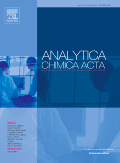
Analytica Chimica Acta
Empowering discoveries through innovative research.Analytica Chimica Acta is a prestigious peer-reviewed journal published by ELSEVIER, renowned for its significant contribution to the fields of analytical chemistry, biochemistry, environmental chemistry, and spectroscopy. Established in 1947, this journal has solidified its reputation, reflected in its impressive impact factors and Scopus rankings, including a Q1 classification in Analytical Chemistry and Spectroscopy, and a Q2 ranking in both Biochemistry and Environmental Chemistry. With its comprehensive scope, Analytica Chimica Acta aims to publish innovative research, critical reviews, and technical notes that advance the understanding and application of analytical methods. As an essential resource for researchers, professionals, and students alike, it encourages the dissemination of high-quality research that addresses contemporary challenges in chemical analysis and promotes interdisciplinary collaboration. While the journal operates primarily on a subscription basis, it also offers unique opportunities for authors to reach a broad audience and engage in the global scientific discourse.

Chemical Methodologies
Pioneering the Future of Chemical ScienceWelcome to Chemical Methodologies, a premier journal published by SAMI PUBLISHING CO-SPC, dedicated to advancing the field of chemistry through innovative research and methodologies. With an ISSN of 2645-7776 and an E-ISSN of 2588-4344, this journal provides a vital platform for researchers and scholars to share their findings in areas encompassing physical, theoretical, and organic chemistry. Despite its initial HIndex and quartile rankings still being established, the journal's evolving impact within the academic landscape is underscored by its Scopus Ranks, which place it in the 35th percentile for physical and theoretical chemistry and the 33rd percentile for organic chemistry. Since its inception in 2022, and continuing through 2024, Chemical Methodologies aims to foster collaboration and knowledge dissemination among academics and practitioners alike, bridging theoretical concepts and practical applications. This open-access platform enhances accessibility for researchers and students worldwide, ensuring that groundbreaking contributions to chemical science reach a broad audience.
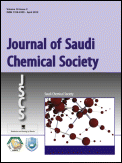
Journal of Saudi Chemical Society
Unveiling the Future of Chemistry with Every Publication.The Journal of Saudi Chemical Society, published by ELSEVIER, stands as a premier platform for advancing knowledge in the field of chemistry. Since its inception in 2009, this Open Access journal has garnered significant attention, securing a prestigious Q1 ranking in the Chemistry (miscellaneous) category for 2023, reflecting its position among the top journals in the discipline. With an impressive Scopus ranking of #66 out of 408 in General Chemistry, this journal boasts a commendable 83rd percentile, underscoring its impact and relevance in the global research community. The journal aims to disseminate high-quality research articles, reviews, and case studies, fostering innovation and collaboration among chemists and allied professionals. By enabling widespread access to cutting-edge research, the Journal of Saudi Chemical Society plays a crucial role in supporting the educational and professional development of students, researchers, and practitioners alike, making it an essential resource for anyone invested in the dynamic field of chemistry.

BMC Chemistry, published by BMC, is a reputable open access journal that has made significant strides since its inception in 2019. Operating under e-ISSN 2661-801X, this journal is dedicated to advancing the field of general chemistry by promoting high-quality research across various sub-disciplines. Headquartered in the United Kingdom, BMC Chemistry boasts a commendable impact factor and is classified in Q2 within the prestigious field of Chemistry (miscellaneous) according to the 2023 category quartiles. The journal's Scopus ranking places it at #139 out of 408 in its category, highlighting its growing relevance and influence in the academic community, with a commendable 66th percentile standing. With a commitment to open access, BMC Chemistry ensures that groundbreaking discoveries and innovative research are available to a global audience, fostering collaboration and development in chemistry. Researchers, professionals, and students alike will find this journal to be an invaluable resource for disseminating knowledge and driving scientific advancement.
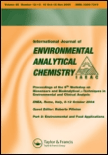
INTERNATIONAL JOURNAL OF ENVIRONMENTAL ANALYTICAL CHEMISTRY
Empowering researchers to shape environmental solutions.INTERNATIONAL JOURNAL OF ENVIRONMENTAL ANALYTICAL CHEMISTRY, published by Taylor & Francis Ltd, stands as an essential resource in the interdisciplinary field of environmental science and analytical chemistry. With a history dating back to 1971 and a convergence period extending to 2024, this journal addresses urgent global challenges by providing a platform for high-quality research that encompasses pivotal aspects of environmental analysis, pollution, and public health. The journal’s significant impact is reflected in its 2023 rankings, placing it in the second and third quartiles across various relevant categories, including Analytical Chemistry, Environmental Chemistry, and Water Science and Technology. Researchers and practitioners are encouraged to contribute to its wealth of knowledge, making it a vital reference for emerging studies in Health, Toxicology and Mutagenesis and beyond. Although it is not an open-access journal, subscriptions provide unparalleled access to groundbreaking research that can influence both academia and industry practices.
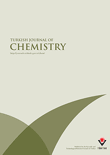
TURKISH JOURNAL OF CHEMISTRY
Unveiling New Frontiers in Chemical ResearchTURKISH JOURNAL OF CHEMISTRY, published by the Tubitak Scientific & Technological Research Council Turkey, serves as a significant platform for the dissemination of research in the diverse field of chemistry. Since its inception in 1996, this peer-reviewed journal has made substantial contributions to the body of knowledge within the field, currently holding a respectable Q3 ranking in the category of Chemistry (miscellaneous) as of 2023. Researchers and professionals alike rely on this journal for its wide-ranging discussions, innovative methodologies, and noteworthy findings pertinent to both fundamental and applied chemistry. With an ISSN of 1300-0527 and a commitment to promoting scientific progress, the journal is accessible to a global audience and encourages the open sharing of insights that drive advancements in chemistry. The extended timeframe of convergence until 2024 highlights the journal's dedication to fostering ongoing research and collaboration within the scientific community. As a valuable resource for researchers, professionals, and students, the Turkish Journal of Chemistry aims to inspire new discoveries and facilitate knowledge transfer in a dynamic and evolving discipline.